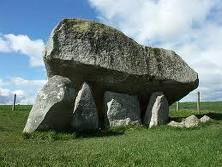
PARABLES SETTING FORTH THE
WICKED COURSE OF THE JEWS.
IT seems that it must have been on the Sabbath-day that Mary anointed Jesus at Bethany. He knew that this was to be his last Sabbath on earth; and as he was spending it at this quiet little village, the disciples that dwelt there came together, so that they might all enjoy his company.
On Sunday he rode into Jerusalem amid the shouts and praises of the multitude. On Monday he drove out the moneychangers from the temple. It was early in the morning of this day that he cursed the fig tree, while passing from Bethany over to Jerusalem.
On Tuesday morning the disciples noticed that the fig tree was withered and dying. During the day our Lord put to silence the Jews, who questioned his authority, and he also spoke several parables setting forth their wicked* course.
He first represented the Jews and the Gentiles by two sons, one of whom, on being asked by his father to go and work in his father's vineyard, said he would not; but afterward he repented, and went. The other, on being invited, said, "I go, sir;" but went not. This last son represented the Jews, who made great professions of godliness, but were still hard-hearted and selfish. The first represented the Gentiles who would yet believe in Christ, and obey him.
He then spake a parable, saying, "A certain man planted a vineyard, and set an hedge about it, and digged a place for a wine fat, and built a tower, and let it out to husbandmen, and went into a far country."
When the season for ripe grapes had come, he sent a servant to ask the husbandmen for a proper share of the fruit of the vineyard; but they caught him, and beat him, and sent him away empty. Then the owner of the vineyard sent another servant on the same errand, but the husbandmen cast stones at him, and wounded him in the head, and sent him away bruised and bleeding." And he sent another; and him they killed; and many others; beating some, and killing some. Having yet therefore one son, his well loved, he sent him also last unto them, saying,
They will reverence my son. But those husbandmen said among themselves, This is the heir; come, let us kill him, and the inheritance shall be ours. And they took him and killed him, and cast him out of the vineyard. What shall therefore the lord of the vineyard do? He will come and destroy the husbandmen, and will give the vineyard unto others when they heard it, they said, God forbid."
Then Jesus looking steadily upon them, said, "What is this, then, that is written? The stone which the builders rejected, the same is become the head of the corner." "This is the Lord's doing, and it is marvelous in our eyes. Therefore I say unto you, The kingdom of God shall be taken from you, and shall be given to a nation bringing forth the fruits thereof."
The Jews knew that this parable applied to them; for they had acted just like the wicked husbandmen.
They had beaten and misused the prophets of God, and some of them they had slain. They were now plotting to take the life of Jesus, God's dear Son.
They would have laid hands on him at once, but they feared the multitude, who regarded him as a prophet.
We are shocked at the hard-heartedness and cruelty of the Jews, but if we are not careful, we shall be found cherishing the same spirit in our own hearts.
We must remember the words of our Saviour, when he said, "Inasmuch as ye have done it unto one of the least of these, my brethren, ye have done it unto me."